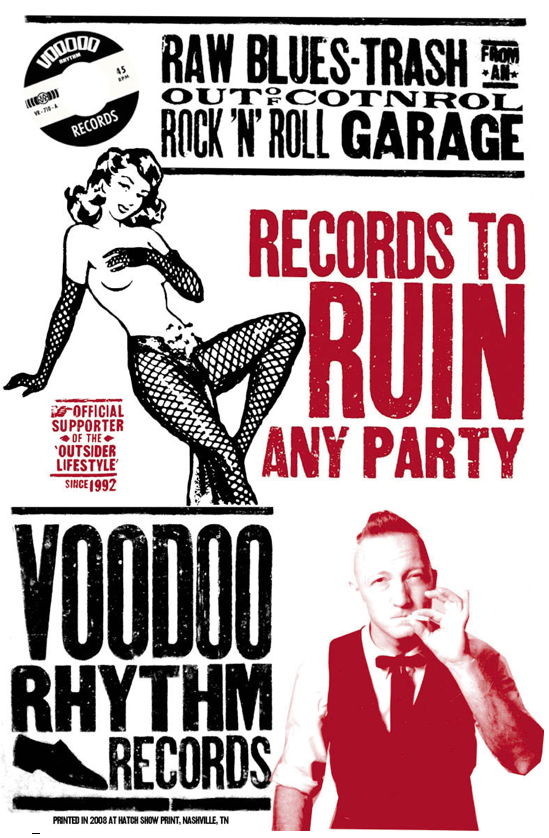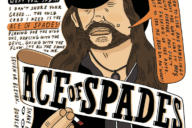Voodoo Rhythm talks in block capitals and broken English. It is loud, batshit crazy and it really doesn’t give a damn about you. The website voodoorhythm.com will tell you that it is a record label. Don’t believe it. No-one walks around wearing EMI T-shirts, with Parlophone tattoos on their sleeves.
No, this is a movement, a cult – a religion. It is the life’s work of one man, Reverend Beat-Man; rector of rock, shaman of soul. In 1992 the Swiss rock ‘n’ roll enthusiast set up Voodoo Rhythm Records as a way of promoting the music he loved. Somewhere along the line heaven and hell came calling, and Beat-Man has been leading them on ever since. “I have both sides in me,” he says; ‘God and the devil. I’m constantly fighting with both of them and it’s a lot of fun.”
If you wanted to get pigeonholing then you might define it as rockabilly, psychobilly or something similar. The Reverend isn’t really interested in that though. ‘Our bands all have their own genres, he says. ‘Primitive rock ‘n’ roll is one of them and blues trash we made up.’
Good food and drink play an important part in the Voodoo Rhythm philosophy. Commandment #4 of the Blues Trash Church is that you sample local cuisine whenever you’re on the road. Commandment #3 is that the drug of choice is beer, not ‘sissy wannabe superstar snow’ – an interesting rule for a record label whose call to arms is ‘we make a junkie out of everybody’.
More than that, Voodoo Rhythm is about the beast with two backs. Rock ‘n’ roll was a euphemism for getting it on way before it got messed around and watered down. Voodoo Rhythm is definitely putting the sex back. Releases have included ‘Get on your knees’, ‘Hormone hop’ and ‘I like going topless’. Bands on their roster at one time or another include the Sixtyniners, The Pussywarmers and the Juke Joint Pimps.
The most important thing, though, is the music. There is no better way to tap into the human psyche than with the wail of a guitar; fast and dirty. Voodoo Rhythm knows this, and is raising two fingers to auto-tuning, overproduction and electronic gizmos. It is a back-to-basics approach that takes things to a primal level.
“It’s something like if you are a bit crazy in your head and you constantly hear someone talking to you,” he says. “That’s exactly how important music is to me. It was always there and will haunt me day and night. No escape at all.”
In a way theirs is an almost tragic story – one of finding your calling only to discover that the world at large doesn’t really care. Put simply, Voodoo Rhythm Records doesn’t sell anywhere near the amount of music that an organisation with that much passion should. It’s like Beat-Man himself said in their documentary: “I have to play guitar, I have to go to the office and put out records nobody buys. I just have to do it. I don’t know why.”
At some point or other the apostle of a religion has to face up to the fact that not everyone is a convert. Some heathens just don’t want to be saved. No matter how many denominations there are in your church, or how many preachers you’re packing, you can’t make them do something against their will. Many people don’t choose to listen to Voodoo Rhythm records, but some do; those that do listen with a passion. “We have a wide spectrum of music,” says Beat-Man, “and if people can take that, that means we have free people with a free spirit: People who can take a chance to experience something completely different. That’s what we want.”
Fifty years earlier they would have been right on the money. These days they don’t even have the hope of some hipster revival to raise their profile. Perhaps it’s for the best though. Bern is a long way from Kreuzberg, just as primitive rock ‘n’ roll is a long way from
commoditisation. Music, sex and religion are all free. Long may they stay that way.
Ross Wittenham







